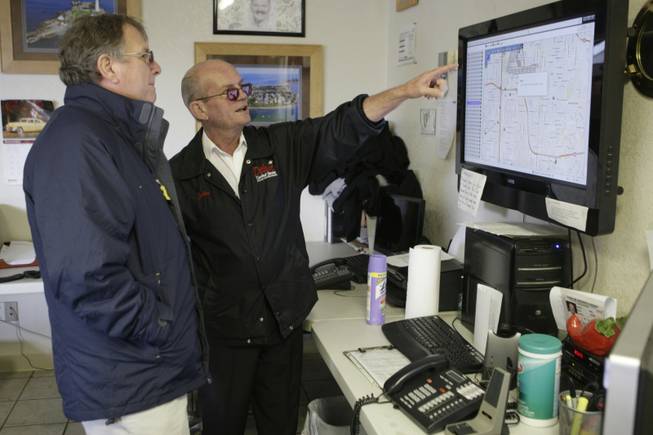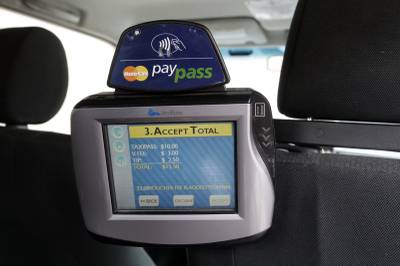
Cab locator: Road supervisor John Homan, center, explains the TaxiTronic GPS technology to new driver Doug Boyle at Deluxe Taxicab Services in Henderson on Dec. 7. Deluxe has a GPS that monitors the whereabouts of every cab in its fleet and is color-coded to inform a dispatcher whether the cab has a customer aboard.
Friday, Dec. 11, 2009 | 3 a.m.
You’ve got a plane to catch.
You’ve called one of the local taxicab companies to get a ride to the airport from your Las Vegas home. You wait. And wait. And wait …
Or, consider the cab driver. He gets a call from a dispatcher directing him to a Las Vegas residence to give someone a ride to the airport. It’s a little out of the way, but the cab driver says can be there within a half hour. But when he arrives, he finds out that another cab company that happened to have a car 15 minutes away had already picked up the customer. Two minutes later, yet another cab arrives. Apparently, the customer called three different companies to hedge his bet on whether a cab would get there fast enough to take him to his destination.
The Nevada Taxicab Authority has begun researching those problems and others relating to issues surrounding residential service standards for the taxi industry.
At the request of the five-member board, the Taxicab Authority conducted an industry workshop to discuss community response expectations. Within a few months, the board may consider developing regulations for residential pickup.
“We’re gathering information at this point,” Taxicab Authority Administrator Gordon Walker said. “We asked (industry officials) to provide some data on how many calls they get for residential pickups and then see if we need to set some kind of service standard. We estimate that 10 percent of the calls are for pickups outside the tourism corridor, but we don’t know at this point what would be considered excellent, good or average service.”
Part of the problem of monitoring calls and pickups is that each company has different dispatch systems and procedures. The Taxicab Authority doesn’t require companies to keep a record of pickup times.
Residential pickup issues have been a concern of the board for years. Board member Robert Forbuss said the workshop was helpful in educating the board about some of the problems they have encountered.
“I think most of the board members feel we should have some kind of performance guidelines, so we’re asking the industry to come forward and help structure those guidelines,” Forbuss said.
Forbuss has some experience in how dispatch systems work — he owned Mercy Ambulance Co. for more than 40 years. When the board decided to proceed with its research, Forbuss spent some time in cab dispatch centers to get a firsthand look at how the systems work.
Los Angeles, San Francisco and Seattle are among the cities that have some form of performance standards, he said.
“I’ve never experienced anything horrendous in terms of a residential pickup, but two board members out of five brought up stories that they personally experienced long response times,” he said. “Although it surprised me a little, I found that everybody in the industry had a positive attitude toward getting something accomplished.”
The Taxicab Authority has made some strides in improving residential service by ordering geographically restricted cabs for companies. Those cabs are restricted from picking up passengers in the resort corridors or at McCarran International Airport. Drivers who violate the restriction can be ticketed by Taxicab Authority enforcement officers.
When the price of fuel climbed dramatically in 2008, some companies with geographically restricted cabs asked the Taxicab Authority to lift the ban so that cab drivers wouldn’t have to deadhead, or run their cabs without passengers, to get back to the geographically restricted zone.
Forbuss thinks keeping geographically restricted cabs may be part of the solution to residential service problems. But another solution may involve improving technology.
Forbuss said Deluxe Cab, the smallest of Southern Nevada’s cab companies with a 1 percent market share, according to the authority’s October statistics, has one of the best monitoring systems in the county.
Steve Findlay, Deluxe general manager, said a global positioning satellite system monitors Deluxe’s fleet. In the company’s Henderson headquarters, dispatchers use a color-coded map to show where every cab is in real time. Colored dots representing each cab shows whether the vehicle has a paying customer inside or whether it’s available to pick someone up.
“It’s really pretty easy,” Findlay said. “We can tell at a glance which available cab is closest to the pickup point.”
By rolling a cursor over the dot on the computer monitor, the dispatcher can identify the cab and can call the driver by radio. Findlay said depending on traffic and the distance to the pickup point, Deluxe can get a cab to most residential locations within 15 to 30 minutes.
The Deluxe dispatch system also timestamps each call so that dispatchers can review calls. The GPS also enables managers to monitor speeds and driver break times. The TaxiTronic monitoring system also is tied in with Taxicab Authority-required videocameras in cabs.
“I think some cab drivers view this as a Big Brother thing, but these systems allow us to see what’s happening. In many cases, these logs will validate what drivers tell us about an accident or an incident with a customer,” he said.
Findlay said Deluxe’s high-tech solution was affordable to the tiny company because it was installed at no cost by a company that also put in a system that enables credit card transactions for fares.
VeriFone Transportation Systems provided Deluxe with the fleet management technology, charging customers $3 per transaction on credit card payments.
Findlay thinks the technology is in part responsible for the company’s improved performance. According to Taxicab Authority statistics, Deluxe had a 29.3 percent increase to 22,077 trips in October over the same month a year earlier. The local industry that includes 16 cab companies had an average increase of 3.4 percent for the same period for the same period.
Deluxe also had a 15.6 percent increase in revenue per medallion in October compared with local industry decrease of 0.5 percent.



Join the Discussion:
Check this out for a full explanation of our conversion to the LiveFyre commenting system and instructions on how to sign up for an account.
Full comments policy